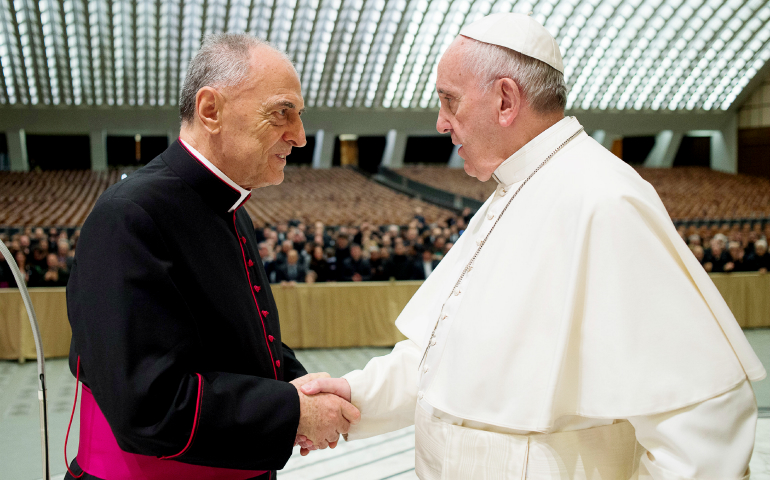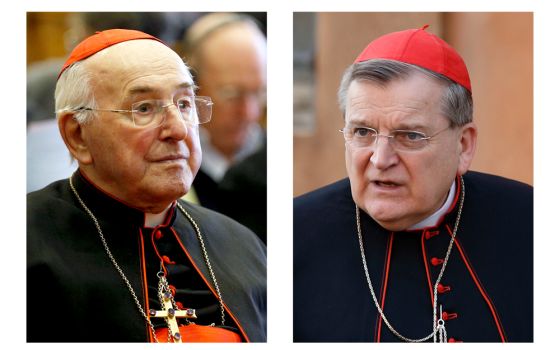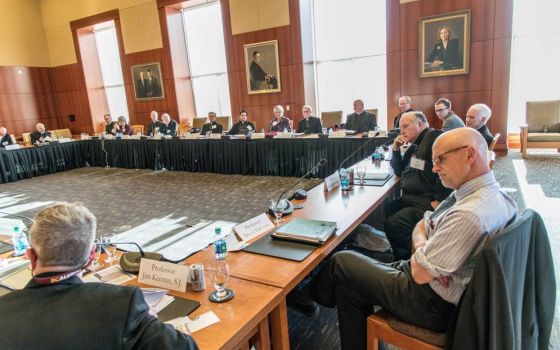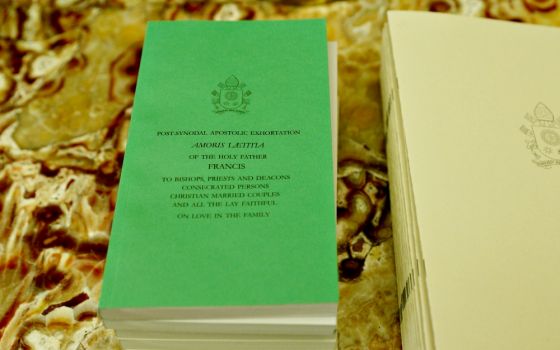
Pope Francis greets Msgr. Pio Vito Pinto, dean of the Roman Rota, in Paul VI hall at the Vatican March 12. (CNS/L'Osservatore Romano)
The prefect of the Vatican's Congregation for the Doctrine of the Faith, Cardinal Gerhard Müller, has called for greater objectivity in the debate over Pope Francis' apostolic exhortation Amoris Laetitia.
"At the moment, it is important for every single one of us to remain objective and not allow ourselves to become divided or even less to trigger polarization," Müller told the Austrian Catholic press agency Kathpress in Rome Dec. 1.
The Vatican will not be replying to four cardinals' Sept. 19 letter in which they questioned Francis' teaching in Amoris Laetitia, Müller said. The letter, made public in November, was signed by Carlo Caffarra, former archbishop of Bologna, Italy; Raymond Burke, head of the Order of Malta; Walter Brandmüller, former president of the Pontifical Committee for Historical Sciences; and Joachim Meisner, former archbishop of Cologne, Germany.
While the doctrinal prefect did not comment directly on the question of whether divorced and remarried Catholics may in certain individual cases be allowed to receive the Eucharist, he did underline that Amoris Laetitia must not be interpreted to mean that the teaching of previous popes and of the doctrinal congregation is no longer valid. He recalled that in 1994, under the then-prefect Cardinal Joseph Ratzinger (later Pope Benedict XVI), the congregation had rejected the suggestion by three German bishops that, in individual cases, divorced and remarried Catholics be allowed to receive Communion.
The indissolubility of marriage must remain "the unshakable basis of any pastoral accompaniment," Müller emphasized.
At the same time, Francis wants to help all marriages and families who are experiencing crises "to find a way of concurring with the ever-merciful will of God," Müller said.
He emphatically denied alleged infighting over the issue in the Vatican. Rumors of "a power struggle behind the high walls of the Vatican or between reformers and those who want to put the brakes on only shows how tainted thinking and the perception of power struggles has become," Müller said.
Meanwhile, Msgr. Pio Vito Pinto, dean of the Roman Rota, the Vatican's appeal court, has called for calm and prayer. "The church needs unity and not walls, the pope has underlined," Pinto said in an interview with the German church's internet portal katholisch.de on Dec. 1.
That the four cardinals had written to the pope and expressed their worries was "in order and legitimate," Pinto said, but the fact that when they had not received an answer, they published their letter some weeks later was a "slap in the face."
It is one thing for the pope to consult with his cardinals but quite a different matter for them to force their advice on him, Pinto said: "They are not a council or a committee but rather to a high extent under obligation to be loyal to the pope. He stands for church unity and it is their duty to support and not hinder him in this."
Asked if it was not possible that the four cardinals are only the spearhead of a wide front of those who are dissatisfied with Francis, Pinto replied, "That is what the media say, but let us stick to the facts. The fact is that the pope had a survey conducted in all dioceses worldwide on the issue of marriage and the family and then invoked two episcopal synods to discuss the replies, which in itself is unique. At the first synod, the majority of bishops and, at the second, two-thirds of the bishops agreed on exactly those issues that the four cardinals are now contesting."
Pinto denied that the four cardinals were threatened with the loss of their red hats and accused the press of taking journalistic liberty too far. "What I said was that Francis was a beacon of mercy and endlessly patient," Pinto said. "He is concerned with agreement and enforcement."
That the four had published their letter was a "grave error," he said, but he did not think Francis would withdraw the four cardinals' red hats. "Francis, as I know him, will not do so," Pinto said.
Burke's announcement that he would publish a formal "correction" if the pope did not define what he had said in Amoris Laetitia concerning Communion for divorced and remarried Catholics more precisely was "madness," Pinto said. "Francis is not only in full accord with church teaching but with all his predecessors in the 20th century."
Officially, the publication of the cardinals' letter was not of any value, Pinto said. "We know Francis. He believes that people can be won over. I know he prays for them."
[Christa Pongratz-Lippitt is the Austrian correspondent for the London-based weekly Catholic magazine The Tablet.]




